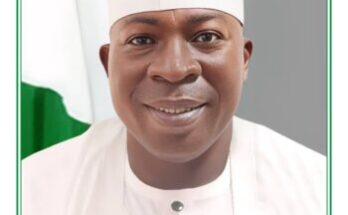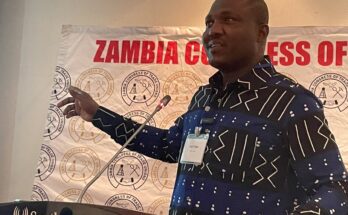Barrister Francis Danladi Kozah is Board Secretary/Legal Adviser, Kaduna State Internal Revenue Service (KADIRS). In this interview with Chamba Simeh, he spoke on the achievements of the agency and why it resorts to sealing up businesses over tax default and the expectations of the service in 2020.
Congratulations to the entire staff and management of KADIRS for unprecedented feat the service achieved in 2019, taking the service from a paltry N12 billion yearly to N44 billion is no mean feat…
Thank you very much. We are grateful to be of service to the good people of Kaduna state and we are assuring them that we will be more dedicated to our work in the year 2020.
If I understand you, does that mean a more aggressive tax drive?
Like you know, everybody wants to grow and improve on whatever he has achieved and for us in KADIRS, we are looking forward to more achievements. We are looking to build on the N44 billion we collected last year. For us, that is just a foundation, which will help us achieve our target for 2020. We look forward to better achievements, which is possible with more dedication to service.
So the companies and every taxable adult should expect more rigorous compliance enforcement. Can you also let us into the secret of your achievement, how did you achieve this unprecedented feat?
What we simply did was to dust our books. And, luckily, we have operated the Kaduna State Tax (Codification and Consolidation) Law, 2016 for over four years now. We have come to appreciate and understand the law better. We exploited the areas that were hitherto unexploited. We capitalised on it and exploited the situation to the advantage of the state which is in dire need of money to fund projects. That is part of the secret. We studied the law, we understood the law better. And since taxation is purely legal, we were better positioned to enforce the law in 2019 following the experiences of the last four years.
You talked about the law and the fact that the service went through reforms and of course the prohibition of cash collection; was that a game changer?
The provisions of that law practically positioned us to do better. When you have done something for four years, there is that tendency that you will appreciate it better to achieve results. Secondly, our staff proved invaluable; they have good understanding of our mandate through several orientation programmes. Kudos goes to the staff who implemented the law and the law itself, which enabled us to do it.
But you must talk about your governor, Mallam Nasir El-Rufai. Last year, you were able to get N9.4 billion from the Ahmadu Bello University, Zaria and Kaduna Polytechnic in backlog of taxes. He refused to succumb to pressure from those institutions to get you off their backs; was that political support critical?
The Chief Tax Officer of the state is the governor, so whatever success we achieve is attributed to him, because without his support we wouldn’t have achieved it. El- Rufai has given us the operational autonomy. He has refused to interfere in our activities and we have leveraged on that to do what we want, of course, within the ambit of the law. The governor has bluntly refused to interfere in our internal affairs. When the ABU matter came up, he simply told us to go ahead and do the right thing; and that was what we did. Anybody who thinks he or she can lobby the governor or any government official to interfere will be wasting time. Your best option remains talking to us.
Having operated this law, the Codification Law 2016, are there areas you want amended and are you already talking with the state government, as this will further help in your collection?
Certainly, it’s a man-made law and subject to errors, amendments, improvements to perfect it. We are working on it. We have made recommendations to the government on the areas we will like to see amended, which will hopefully expand the horizon, especially in the area of betting and gaming, like the popular Naijabet and we want to explore that potential. We have met with the deputy governor on the need for them to encompass it into the law. There are other laws, other provisions that we have also recommended to government to strengthen our enforcement mechanism and to also encourage voluntary compliance and the tax payers will benefit from that voluntary compliance. They are studying our proposals. Very soon we expect the House of Assembly to hold public hearing to allow people make their input. There are several engagements on the issue, because we operate an open door policy.
Why do you think you deserve to get a bite of Naijabet?
People are making a lot of money from it and the law is very clear that whatever income you make is taxable, whatever business you do, you are expected to declare your income. We are exploring that potential and we believe that 2020 we will make a good chunk of money from that. Our projection is over N2billion all things being equal. Lagos state is already making a lot of money from taxing winnings. We had people from South Africa who have opened our eyes to the huge potential.
Let’s talk about the N44 billion. How has that affected the atmosphere in the service, the morale of staff and is that also the source of the chairman’s confidence that the service can do over N60 billion in 2020?
The staff are very happy that they have surpassed the 2019 target. They feel fulfilled that they have contributed their own little quota to the development of Kaduna state. I think that will spur us all to greater performance in 2020 by God’s grace.
So is the N60 billion achievable?
It’s surpassable with support from government and relevant stakeholders.
Are you being over ambitious?
We are not, because the opportunities are there. Quite clearly, KADIRS means business. Early this year the service sealed two commercial banks – FCMB and Keystone – for refusing to remit backlog of PAYEE taxes.
Before this, you had equally restrained Access Bank. Can you take me through the process from tax audit and why you are compelled to eventually take the steps you took?
Taxation is purely a legal matter. When we discover that somebody is owing us, corporate or individual, we conduct a tax audit on that person. We look at the books of that organisation or person and issue a report after the tax audit is conducted. This tax audit could be by back duty, I mean past years of your activities which can either be Pay As You Earn, withholding taxes, etc. So, it’s always a back duty thing. The problem most times is refusal to remit, or failure to remit the correct amount. If the organisation or individual remitted what they ought to we shake hands, but if they haven’t we send out a demand notice, which will state what is being owed and the period. By law, the taxpayer is expected to respond in either of two ways- he agrees or challenges the figures. And the reasons are stated. A Tax Administration Reconciliation Meeting will be held to reconcile any differences. Tax consultants, accountants, lawyers are allowed to represent any taxpayer. The issues will be thrashed out and final figures agreed. At the end, if there is the need for reassessment, we reassess. But once a decision is taken the taxpayer is expected within 30 days to settle or challenge the final assessment at the Tax Appeal Tribunal or High Court. We only resort to enforcement if after 30 days the taxpayer didn’t pay or challenge that final assessment, it’s then and only then that the service resorts to what is clearly the last option. And there is a process. First, we approach the court for an order to levy restraint and once the order is obtained and we levy restraint the taxpayer must pay up to have his premises reopened. But the service is not interested in sealing up any business premises, so we are always patient.
Are you saying FCMB, Keystone and Access banks when you issued them with demand notice they did not take any step?
They took steps. We held several meetings with them, it was their failure to pay that led to enforcement. Unknown to many taxpayers is the fact that tax process is special, it’s sui generis, it’s not a normal legal process. It is a special process meant to govern tax administration. Section 104 (3-4) of the Personal Income Tax Act gives us the power to go to court once the assessment is final via an ex parte application. All we need do is show the court that we have followed due process and the court will grant us the order. That was what happened in the case of the banks were retrained. We endeavour to satisfy the requirements of the law before enforcement. We are not happy sealing up any premises.
Your mandate is to generate revenue for the state government. You’ve been forced to seal up businesses but the state is desirous of attracting investors. How are you managing the delicate relationship?
You know there is nowhere in the world that you don’t pay tax. Like I said earlier, Kaduna state taxes are the lowest. So that’s an incentive for people to come and invest here. The state also gives tax holidays for new companies. We are conscious of that fact, which is why we ensure that our action is guided by the law. Kaduna state has eliminated double taxation. So our actions do not in any way inhibit business rather they encourage people to come because we have a congenial business atmosphere. Our laws are codified and consolidated. And because the laws are available, they can be easily appreciated by investors as their tax obligations are in black and white.
Your Executive Chairman, Dr Zaid Abubakar, has been very particular about professionalism. I see a lot of ICT innovations to aid your operations, is the e-tax management platform fully deployed?
It’s fully deployed. Last week Thursday, Zamfara State Revenue Board came to Kaduna State Inland Revenue Service to understudy our automation process, just like many other states have been coming to KADIRS to understudy our operations. Our auto-vehicle automation is perfect so we encourage people to make use of these facilities.
Can you expatiate on the Development Levy of N500 for every taxable adult; what is your target?
About N7million; everybody including traditional rulers have keyed into the levy. We are working hard to ensure compliance.



